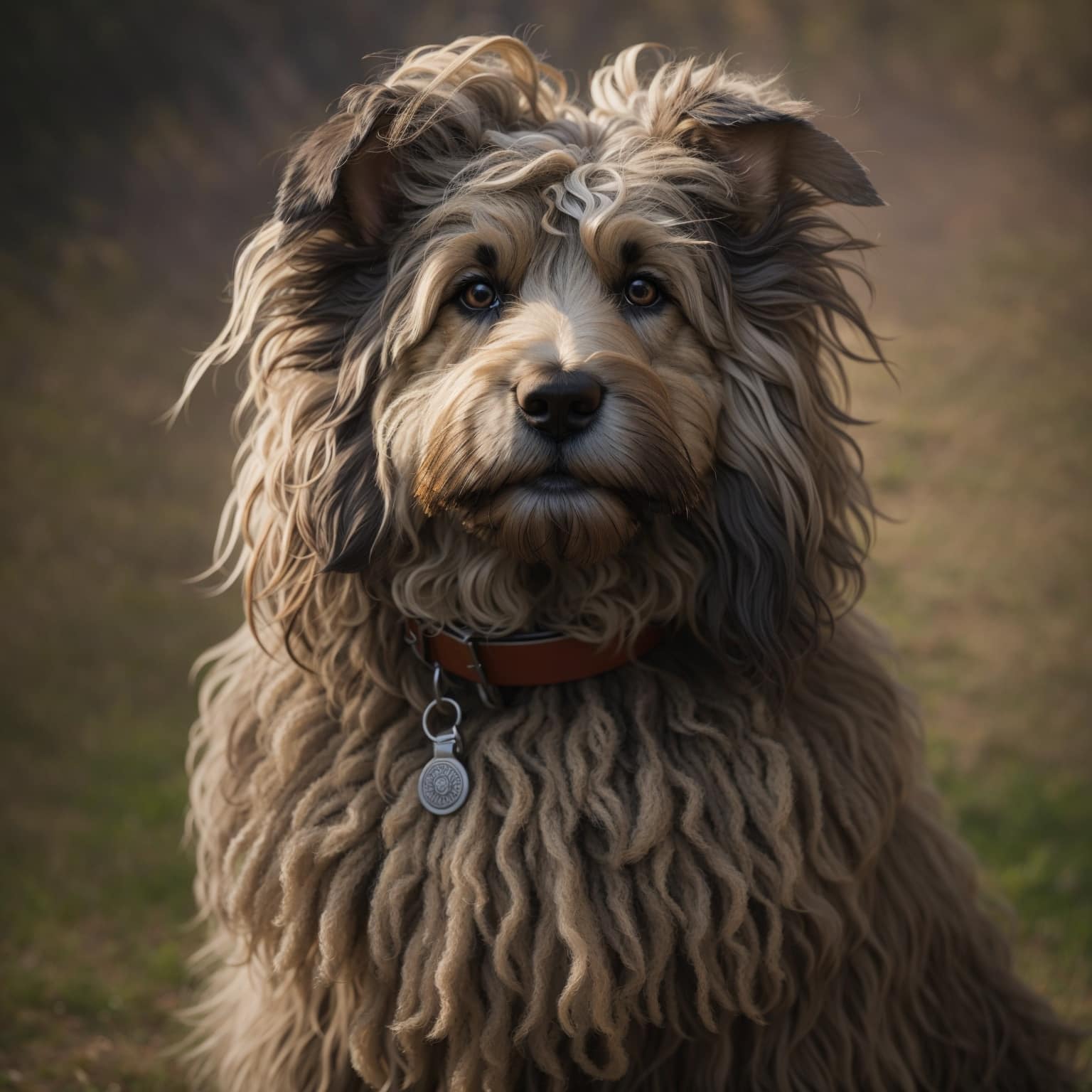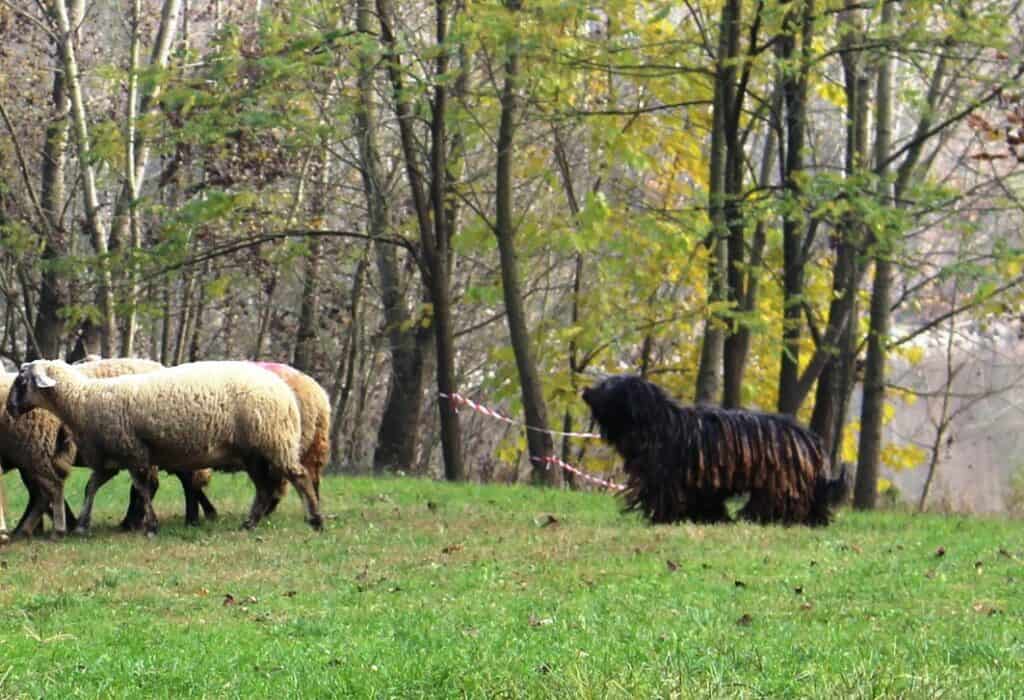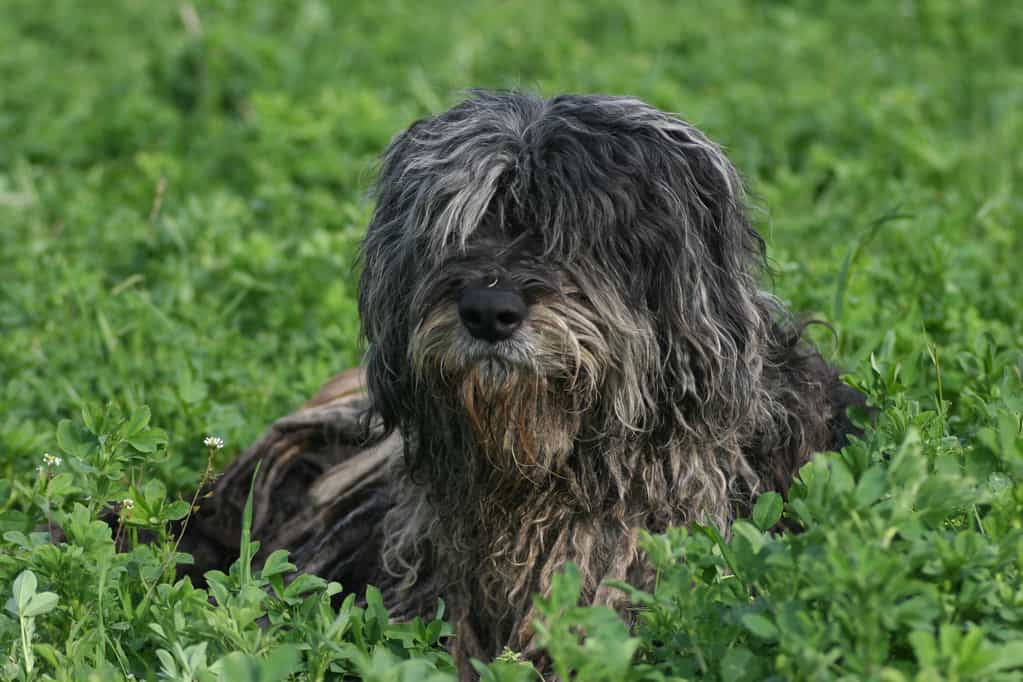The Bergamasco Shepherd, an epitome of ruggedness, unwavering loyalty, and exceptional herding skills, has made its mark among dog enthusiasts and shepherds. With Italian origins, distinctive physical features, and a unique set of temperament traits, this breed is revered as an agile and dependable herding dog with a unique coat.

| ategory (Explanation) | Breed Information |
|---|---|
| Year of Breed Conception | Ancient breed |
| Country of Origin | Italy |
| Weight (lbs & kg) (Male) | 70-84 lbs (32-38 kg) |
| Weight (lbs & kg) (Female) | 57-71 lbs (26-32 kg) |
| Coat Type | Unique felted coat of mats and cords |
| Color Variations | Grey or silver |
| Shedding Level (Low, Moderate, High) | Low |
| Height (cm & in) | 22-24 inches (56-61 cm) |
| Breed Size | Medium |
| Trainability (Low, Moderate, High) | High |
| Mental Needs (Low, Moderate, High) | High |
| Intelligence Level (Low, Moderate, High) | High |
| Energy Level (Low, Moderate, High) | Moderate |
| Agility (Low, Moderate, High) | High |
| Loyalty (Low, Moderate, High) | High |
| Playfulness (Low, Moderate, High) | Moderate |
| Exercise Needs | Regular exercise and mental stimulation |
| Guarding Proficiency (Low, Moderate, High) | Moderate |
| Sociability with Children (Low, Moderate, High) | High |
| Barking Level (Low, Moderate, High) | Low to Moderate |
| Digging Tendency (Low, Moderate, High) | Low |
| Destructive Behavior (Low, Moderate, High) | Low |
| Drooling Level (Low, Moderate, High) | Low |
| Obedience Level (Low, Moderate, High) | High |
| Apartment Friendly (Yes/No) | Can adapt to apartment living with sufficient exercise |
| Inherent Prey Drive | Moderate |
| Physical Risk to Others (Low, Moderate, High) | Low |
| Travel Fatality Risk (Low, Moderate, High) | Low |
| Allergen Potential | Low |
| Health Concerns (List of Common Health Concerns) | Hip Dysplasia, Eye Issues, Bloat |
| Average Life Expectancy (Life Expectancy in Years) | 13-15 years |
Woof Mastery is reader supported and our articles may contain affiliate links.
Instead of running third party ads that we have no control of we only use links from high-quality companies we are directly partnered with. Making use of these links come at no cost to you our reader, and in many cases have the extra benefit of discounted rates or sign up bonuses.
If you’re interested you can read more about our affiliate policy here.
We appreciate your support and always insure that the products and services we recommend are high-quality, helpful and relevant to the subject at hand!
The Bergamasco Shepherd’s history is one of uniqueness and rugged charm. These dogs originate from the Italian Alps and are recognized for their distinctive corded coat.
The cords in their coat provided insulation and protection against the harsh Alpine climate. Their intelligence and loyalty made them well-suited for herding and guarding tasks in the region.
Today, Bergamascos are celebrated for their distinctive appearance and herding abilities. They are known for their devotion to their human families and their capability as working dogs.

The Bergamasco Shepherd is special for its unique corded coat and herding skills. These dogs have a history of working in the Italian Alps. Their distinctive appearance and adaptability make them stand out as herding and companion dogs.
Bergamasco Shepherds have a history of herding and working in the Italian Alps. Their unique corded coat served as insulation and protection while herding livestock in challenging mountain terrain. Today, they continue to work as herders and are cherished family pets, preserving their heritage as capable working dogs.
Bergamasco Shepherds have unique and determined personalities. They are known for their agility and herding instincts, as well as their distinctive corded coat. These dogs excel in herding and protecting livestock in challenging terrains.
Their agility and work ethic make them dependable herders, and their affectionate nature with their families is evident. Bergamasco Shepherds are characterized by their uniqueness, determination, and a devoted disposition, epitomizing the ideal blend of agility and companionship.
Bergamasco Shepherds are intelligent and independent. They can be good with children and other pets but may be reserved with strangers. Early socialization is important for a balanced temperament.
Mental and physical stimulation is crucial for their well-being.
Bergamasco Shepherds are medium-sized dogs with a unique and rustic appearance. They have a well-proportioned head with expressive eyes and long, floppy ears.
They have a distinctive coat made up of dense, felt-like mats, which serve as protection against harsh weather. The coat can be various shades of gray. Their tail is long and carried low.
Males typically stand between 23.5 to 26 inches (60-66 cm) at the shoulder and weigh between 70 to 84 pounds (32-38 kg), while females are slightly smaller and lighter.
Bergamasco Shepherds have a rugged and rustic appearance, reflecting their role as herding and working dogs.
Bergamasco Shepherds have a distinct corded coat, which can vary in shades of gray, black, or fawn, contributing to their rugged appearance.
Bergamasco Shepherds have a distinctive corded coat pattern that gives them a rugged appearance.
Bergamasco Shepherds have a moderate shedding level. They shed consistently, with seasonal variations. Regular grooming is essential to manage shedding, especially due to their unique corded coat.
Bergamasco Shepherds have a unique coat that forms mats, requiring specialized grooming. Grooming habits for this breed include:
1. Mat Care: Mat care is essential for Bergamasco Shepherds. Mats in their coat should be separated gently by hand to maintain the distinctive look of their coat.
2. Bathing: Bathe them when necessary, using a dog-specific shampoo and thorough rinsing.
3. Ears: Check and clean their ears regularly to prevent wax buildup or infections using a veterinarian-recommended ear cleaning solution.
4. Nails: Keep their nails trimmed to a comfortable length to maintain proper gait and prevent discomfort.
5. Teeth: Brush their teeth regularly to ensure dental health and prevent bad breath. Dental chews or toys can be helpful.
6. Tail and Paw Care: Maintain cleanliness in the tail and paw areas, inspecting for any signs of irritation or injury.
Bergamasco Shepherds have a moderate activity level and require both physical and mental stimulation. Key points about their activity level include:
1. Exercise Needs: Bergamasco Shepherds need daily exercise to stay content. Activities can include walks, playtime, and interactive tasks.
2. Energy Level: They have a moderate energy level, which requires regular exercise to keep them happy.
3. Herding Heritage: Historically, Bergamasco Shepherds were bred for herding livestock. They excel in activities like obedience training and herding.
4. Mental Stimulation: In addition to physical activity, mental challenges through training and puzzle games are important to keep them mentally sharp.
5. Family Companions: They make good family pets and enjoy spending time with their human companions.
Caucasian Shepherd Dogs are intelligent and possess a strong sense of independence. Here are some key points about their intelligence:
Caucasian Shepherd Dogs’ intelligence and protective instincts make them excellent livestock guardians. Early training and socialization are essential for a well-adjusted and obedient companion.
Bergamasco Shepherds are intelligent and need mental stimulation. Engage them in obedience training and activities that challenge their minds to keep them sharp.
Social Interaction: They are social dogs and require regular interaction with their human family. Loneliness can lead to anxiety or destructive behavior, so provide companionship and attention.
Exercise: Mental exercise is equally important. Offer them tasks that challenge their problem-solving skills.
Training and Obedience: Bergamasco Shepherds benefit from obedience training and activities that engage their minds. Consistent, positive-reinforcement training is effective in shaping their behavior.
Enter The Woof Mastery

Thinking about a Bergamasco Shepherd? Keep these considerations in mind:
1. Activity Level: Bergamascos are active dogs that require regular exercise and mental stimulation.
2. Coat Care: They have a unique corded coat that requires special grooming to prevent matting.
3. Space: Bergamascos need space to move around comfortably, making them better suited for homes with yards.
4. Herding Instinct: They may exhibit herding behaviors, so consider socialization and training.
5. Work or Activities: Some Bergamascos enjoy tasks or dog sports that engage their minds and bodies.
Bergamasco Shepherds, known for their unique appearance, may pose a physical risk to others if not properly socialized, trained, or managed. The risk assessment factors include:
1. Protective Instinct: Bergamasco Shepherds may have a protective instinct, especially towards their family or territory. Proper training is essential to manage this instinct.
2. Socialization: Early and thorough socialization is crucial to ensure Bergamasco Shepherds are comfortable around people and other animals. Poor socialization can lead to fear or aggression.
3. Training: Obedience training is essential to teach Bergamasco Shepherds appropriate behavior and ensure they respond to commands. Well-trained dogs are less likely to engage in aggressive behavior.
4. Owner Responsibility: Responsible ownership involves being aware of the dog’s behavior and taking necessary precautions in public settings.
5. Breed-Specific Legislation (BSL): Bergamasco Shepherds may not be commonly subject to BSL, but owners should be aware of local regulations.
6. Individual Variability: Each dog is unique, and behavior can vary. Responsible ownership, proper training, and socialization are key to minimizing the potential physical risk to others.
Bergamasco Shepherds can be good with children. They are affectionate, intelligent, and may form strong bonds with kids. Their unique appearance and corded coat can make them intriguing playmates for children.
Bergamasco Shepherds may be capable swimmers. Their corded coat pattern can add buoyancy in the water. Individual comfort levels with swimming may vary, so assess your dog’s preferences and supervise them when they are near water.
Early and positive training will help your Bergamasco Shepherd puppy become a well-behaved and devoted companion.
Bergamasco Shepherds are usually moderate in terms of noisiness. They may use vocalizations, such as barking, in response to unusual activities or situations, but they are not excessively loud.
Bergamasco Shepherds thrive in homes that provide:
Challenges:
Traveling with Bergamasco Shepherds involves these considerations:
Bergamasco Shepherds are generally healthy, but they may be prone to certain health concerns, including:
Proper nutrition is essential for Bergamasco Shepherds. Follow these nutritional habits:
Proper nutrition is essential for the health and well-being of Bergamasco Shepherds.
Breed-specific laws (BSL) may affect Bergamasco Shepherds in specific areas, and owners should be aware of these regulations. BSL is typically enacted at the local level, and the restrictions can vary from one jurisdiction to another. Here are some common types of BSL restrictions that Bergamasco Shepherds may encounter:
The rationale for BSL is often based on concerns about public safety and perceived risks associated with specific breeds, including Bergamasco Shepherds. However, it’s important to note that Bergamasco Shepherds are not inherently aggressive, and BSL may affect them due to their physical resemblance to breeds sometimes included in these laws.
BSL is a contentious subject, and many advocates argue that it unfairly targets breeds rather than addressing individual dog behavior. They emphasize that responsible ownership, training, and education should be emphasized instead of breed-specific restrictions.
To determine if there are breed-specific laws or restrictions regarding Bergamasco Shepherds in your area, you should check with your local animal control or government authorities. Be aware of and comply with any local regulations to ensure that you are in compliance with the law while owning a Bergamasco Shepherd.
Woof Mastery is reader supported and our articles may contain affiliate links.
Instead of running third party ads that we have no control of we only use links from high-quality companies we are directly partnered with. Making use of these links come at no cost to you our reader, and in many cases have the extra benefit of discounted rates or sign up bonuses.
If you’re interested you can read more about our affiliate policy here.
We appreciate your support and always insure that the products and services we recommend are high-quality, helpful and relevant to the subject at hand!
Myth 1: Bergamascos are Always Matted and Unkempt
Truth: While their unique coat can mat, Bergamascos require regular grooming and maintenance to keep their coat healthy and tidy.
Myth 2: They are High-Maintenance Dogs
Truth: Bergamascos have specific grooming needs due to their coat, but they are not overly high-maintenance. Regular care can keep their coat in good condition.
Bergamasco Shepherds are known for their distinctive corded coat and herding abilities. While specific famous individuals may not be widely documented, they have made notable contributions in herding roles, especially in their native regions.
Bergamasco Shepherds have a unique appearance and have been owned by individuals who value their herding abilities. Specific historical owners may not be widely recognized, but these dogs are known for their distinctive corded coat.
Bergamasco Shepherds, like all breeds, face certain challenges and dangers. Some of the greatest dangers and concerns for the breed include:
By understanding these challenges and providing responsible ownership and care, many of these dangers can be mitigated to ensure the well-being of Bergamasco Shepherds.
The Bergamasco Shepherd is an Italian breed known for its distinctive corded coat. Its development likely involved local herding dogs with unique coat textures, selectively bred to create the characteristic cords that protect the dog from harsh weather and predators.
The Bergamasco Shepherd is a unique breed known for its herding skills and distinctive corded coat. Their tenacious nature and striking appearance have made them cherished working dogs and companions.
Owning a Bergamasco Shepherd involves providing mental and physical stimulation, grooming to maintain their corded coat, and regular veterinary care. Responsible ownership includes addressing potential health concerns and nurturing their herding instincts through training.
With their one-of-a-kind corded coat and resilient disposition, Bergamasco Shepherds continue to captivate those who appreciate their uniqueness and dedication in both work and companionship.